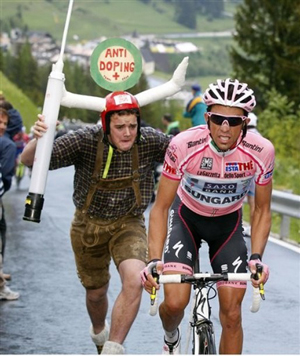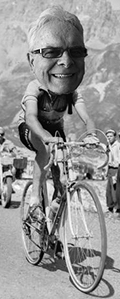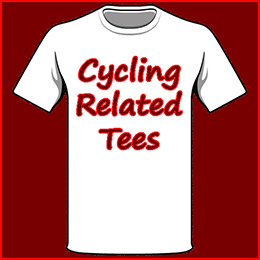Nothing Changes
 Tue, May 24, 2011
Tue, May 24, 2011  I became interested in the sport of cycle racing in the early 1950s.
I became interested in the sport of cycle racing in the early 1950s.
It was common knowledge that the top European professional cyclists competing in the Tour de France and the Giro d’Italia took dope.
Amphetamines to be precise. How did I know this? I was only 16 years old at the time.
It was not reported in the Cycling Press, there were no stories about doping in newspapers. It was obviously just passed on down from the top echelons of the sport by word of mouth.
It was never considered “Cheating.” After all if the entire TDF peloton was using dope, the playing field was level. These riders rode over the same mountain ranges they do today, when the roads were often no better than dirt tracks. Stages were often in excess of 250 kilometers, 156 miles, as a 16 year old I figured dope was necessary.
So if a 16 year old knew about it, then obviously the UCI knew of it, and also the cycling press. But none of them did an expose of the situation. Not until British cyclist Tom Simpson died on Mt. Vontoux during the 1967 Tour de France.
He died of heat exhaustion, but had pushed his body beyond its limits with the aid of amphetamines. The world's press was all over the story, and then the Cycling Press and the UCI acted in shock and horror, as if not knowing that this practice was going on right under their noses.
Doping in cycling has probably been in existence since the beginnings of the sport. Certainly since the start of professional cycling where there was money to be made, and promoters calling for faster and longer races. And if it was in cycling it was obviously there in other professional sports.
I am sure by now everyone in the cycling community has seen the Tyler Hamilton interview on 60 Minutes. If you haven’t seen it here is a short version. After watching it I feel like a fool, I really thought the sport was changing and they were at last getting a handle on the dope situation.
Now I find the only thing that has changed over the years is that is that drugs have become more sophisticated, and less easy to detect. And instead of being an open secret amongst the cycling community, as it was prior to the 1960s, it is now an open secret only among the professional cyclists themselves.
So here we are today 44 years after Tom Simpson’s death; the UCI still looks the other way, and wishes the whole doping thing (In particular the media talking about it.) would just go away. Should we really expect any different? The man at the top of the UCI is an ex-professional cyclist, am I to assume he never took dope during his career?
Tyler Hamilton’s claim that Lance Armstrong’s positive test in the 2001 Tour of Switzerland was “made to go away,” by the UCI, has a ring of truth to it. Because Alberto Contador’s clenbuteral positive was at first kept quiet by the UCI.
The UCI knew of it within days of the test in July 2010, but failed to make it public until September 2010, when the story was leaked by the testing lab. Had the story not been exposed, would Contador’s positive been made to go away also?
I still don’t see doping a cheating. It appears all top professionals are doing it so they compete on more or less equal terms. The only ones being cheated are the fans being led to believe the sport is clean.
However, doping is bad because young athletes see the pros do it and think it is okay to use that stuff, and it is not, especially using it unsupervised. There are some dangerous consequences.
The only way to stop drug use in professional sport is to make shame and the consequences of being caught not worth the risk of doing it.
 Comment,
Comment,  Drugs in Sport,
Drugs in Sport,  Opinion,
Opinion,  UCI
UCI 





















Reader Comments (12)
I used to believe that out of so many riders, surely there were a few who were clean. Then I started reading about the history of the TdF from its inception till today. It appears that if one is clean, one doesn't win very much. Those at the top who reigned not only were genetically gifted, but they trained hard and also "prepared" well for the races.
While I sympathize with your concern about the effects on young athletes, I'm not sure that's a sufficient defense for wanting any professional sport to be "clean." Fact of the matter is that youth are exposed to all manner of drug whether they participate in a sport or not, and the only mediator I find effective is good information and trustworthy counsel.
After decades of believing the contrary, I'm finally to the point where I am willing to acknowledge that performance enhancing drugs are so deeply embedded in all professional sport (because of the financial incentives if no other reason), that we need to just "get over it" because we can't eradicate it. And, if we can't eradicate it, then we can't apply the sanctions equitably and fairly. Chemistry and pharmacology (whether top drawer or back door) will always be two steps ahead of any testing program. The drugs whose presence we'll penalize two years from now - because we'll have developed the means to test for it - are already in circulation. Are we forever going to be amending the "leader board" and the "medal awards" retrospectively? This strikes me as nuts.
There are other things coming down the pike - DNA enhancements, anyone - that will confound this question in even more complex ways. I'm ready to say, Okay. This is professional sports. These are adults (somewhat older or younger - no matter). And, the risks they're willing to take for sport, are their risks to take.
Unfortunately, when greed and smartness trump intelligence this is what happens. If UCI would really do comprehensive testing for performance enhancing drugs, who would watch TdF (or a simillar extreme cycling race) going at 25 km/h on level ground and the competitors pushing their bikes up the hills? UCI would lose tons of money, cycling clubs too, and the professional cyclists would be paid almost nothing. Especially the spectators and other people who vote for cycling races with their money need to intelligent up and stop supporting all this toxic circus. Demand the end of the use of performance enhancing drugs not with jaw-muscle exercises, but with stopping the cash flow from your wallet to their pockets.
Well, it's either make any and all drugs legal or . . . what about a paradigm shift? What if the longest grand tour were only 8 stages with a rest day in the middle, and no stage could be longer than 80 miles or take longer than 4 hours to complete due to mountain passes? These are more do-able in terms of normal human endurance without drugs.
Think of it, more countries could have a grand tour. What percentage of the fans can pay attention to the grand tours as they are? It's an existing trend to be built on: ToC, Down Under and other shorter tours/races in recent years are apparently enjoying some success. It would open up other markets and widen the popularity of the sport - a Tour of South Africa, Canada, Brazil, . . . imagine the possibilities!
Watching Lance ride away with ease, Floyd Landis in one stage take off like a bat out of Hell, Contrador doing the same this year, Having ridden in races like you Dave, I dont remember any of the my oposition doing that, . So what makes a man a super human? it aint the Wheaties he eats for breckie! But of course its all about $$s Dont tell me, that the trainers and managers AND SPONSORS have no knowledge about this! What ever it takes. DO IT! Same with ALL pro sports, Legalize drugs let em all go at it, As long as the PUBLIC keeps buying the sponsors goods etc, Athletes will continue to do what ever it takes to win. BOYCOT the sponsors show you care.
Keep in mind that Lance's whistle-blowers have been banned for the same thing. That said, it's still a shame to watch a super-human effort, the podium awards, and then see that the next place finisher has been awarded the race title. Who's next? Anquetil? Merckx? Coppi?
As for smaller tours being successful or fading away, does anyone else remember the Red Zinger Classic, later called the Coors Classic? I don't understand why that one failed other than its last version had stages throughout the west ( prolog in San Francisco). I would think that for a tour to be successful it must be located in a region of relative prosperity and have the full support of the local and cycling community.
Nice blog post, thanks. It's good to know about the history of the tour and the rampant use of drugs over time.
Hincapie has not been banned and he claims to have doped with Lance. Will be interesting to see what happens with the feds, etc on that one.
Jim, a new tour in Colorado is happening this year. Check out http://www.usaprocyclingchallenge.com/
thanks
Jeff, Thanks for the link. Too bad they didn't list the race routes with more specifics. Now I'm more homesick than ever. Pikes Peak or bust!
I am old enoug
t to remember this, so maybe my memory is shot. But did't Anquetil boycott the 1965 Tour because they started drug testing
Any clean cyclists? next to none, probably.
The UCI is to cycling what the WWF is to wrestling.
I think the athletes being penalized are the ones who cannot afford the supervision of a complicit doctor & cannot afford the masking procedures that make doping invisible to testing. The riders on teams where doping strategies are elemental to the teams' overall race strategies are protected, while riders who freelance on their own budgets are left unprotected. Perhaps this is why riders like Hamilton and Landis test positive when they leave a powerhouse team. And perhaps this is why up and coming riders like Basso and Ricco spend some of their prime cycling years out of competition while they serve suspensions. Meanwhile, the wealth superstar athletes have every resource at their disposal to protect them, both medically before testing and legally after testing. Of course, like in all professional sports, the financial rewards for successful doping are tremendous.
Therefore, I think the only way to BEGIN to cut doping out of the sport is to enact complete black lists for dopers. If an athlete, soigneur, doctor, directeur sportif or other participant is found to have violated anti-doping regulations in any way, they are no longer allowed to participate in the sport in any capacity for the rest of their life. But this won't happen, partially because most people want to believe in redemption almost as much as they want to believe in heros, but also because there are far too many people whose income relies on the drama doping produces in cycling.